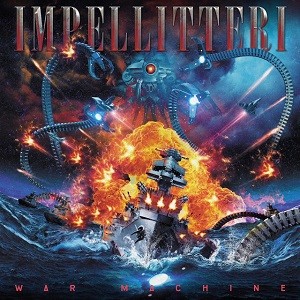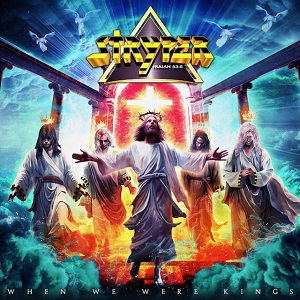SCORPIONS - Humanity – The Rudolph Schenker Interview
September 4, 2007, 17 years ago
The Scorpions have always had an eye and an ear open to world events. In the late ‘80s, the band struck a chord with 'Wind Of Change' becoming the unofficial song of the Berlin Wall coming down and of Gorbachev’s Glasnost initiatives. Fast-forward a couple of decades and the band is back with an album, Humanity Hour 1, that not so subtly offers commentary on the Iraq war, the Presidency of George Bush and civilization. With the band’s recent passage through Montreal, BW&BK; sat down for over an hour with guitarist Rudolph Schenker to discuss the new album and all things Scorpions and we offer you the following highlights of that chat.
Mitch Lafon: Is Humanity Hour 1 a concept album?
Rudolph Schenker: “In a loose way, yes, because it’s all about humanity and being human. Desmond (Child – producer) said that ‘You guys have a lot of history and it’s time to make a more mature album. You already did the soundtrack for the most peaceful revolution of the twentieth century. It’s time again to cover a message.’ We don’t want to preach, but we do want to lift up the collective consciousness. There is a message and it’s a concept album, but not in the old way. It’s about 10,000 years of humanity (what human beings have done) and what we have to take care of to not lose our way of living on this planet. People who listen more times to the album are finding out their own message about the whole thing. It’s good to give messages, but not preach and most important for the Scorpions is to make a rock album with great songs while not being a band of yesterday. We’re a band of today with a long history.”
ML: I agree. You’ve taken the ‘classic’ elements of the Scorpions’ sound and transformed them enough to make them sound modern and fresh. This is not an ‘80s album. You’ve really moved the music forward and I have to give you credit.
RS: “Thank you very much. We were going to do an album in my studio, but then we said ‘Are we making another album just to show fans we’re still alive or are we doing an album to please ourselves?’ And that’s a very important point. This is why Desmond Child got the job. His way of thinking about what the Scorpions can do and what should be done was the right way for us. We knew that we needed somebody to really lift us up. He’s a great composer and a great producer. He also involved another producer James Michael. Desmond said that he wanted to make sure that the vocals and overview were done very well and James did the guitar, bass and drums. It was good working in two studios. We noticed with the side-projects, Acoustica, Moments Of Glory and Eye II Eye, that when we did it the old way we weren’t 100% happy. First of all, we thought the songwriting could be better and secondly, the sound. Unbreakable was a good start to come back to the roots.”
ML: Tell me about working with Desmond Child. Was there a stigma that he was too ‘‘80s’ and maybe too ‘pop?’ Were you worried that he might soften up your sound too much or that you would make an ‘80s album?
RS: “No, because after talking to him we noticed immediately that he did not want to make an ‘80s album with us. Chemistry is the most important thing – we know what we can do, but we also know what Desmond can do. Desmond was the right spice for the Scorpions sound.”
ML: Was it important for you to make a rock album?
RS: ‘We felt that rock music was coming back again and we noticed from our web site that fans were saying ‘You can do so many things, but why not another album like Blackout?’ That put us in a position where we did Unbreakable and now this album. Our goal is to make rock music somehow hip again. So many young bands like Green Day, System of A Down and Nickelback have said they are influenced by Aerosmith or the Scorpions. Billy Corgan (Smashing Pumpkins) who is a guest on ‘The Cross’ went crazy when I met him. He said ‘I have everything from you guys. Everything!’ So, you get to the position where you say this guy nearly kicked us out of business, but you can see he’s a big fan. So, we have to find a way of mixing our way of being Scorpions into 2007, 2008, 2009 and 2010 by getting this music on a different level. That’s what we tried to do and that is why this album sounds fresh, modern and has a lot of attitude. We’re a band. We’re a band of today and we’re still in it to make something outstanding. We don’t want to lie on the beaches of the world and get lazy. We want to deliver something great.”
ML: Why have the Scorpions lasted so long? Bands today seem to only have one single and that’s it.
RS: “For me, to really make the music fun works only if you have people around that you can build a friendship with. When I was looking for musicians, I was looking for friends. This was my philosophy and this philosophy is paying off now. That’s the reason we can still go on the road, having fun, pleasing fans and making good projects. This is the reason the Scorpions are still around. Building friendships that was something that has helped the Scorpions to still be the Scorpions and have success.”
ML: Last summer you played Quebec City with Twisted Sister opening up and 80,000 people showed up…
RS: “The Quebec show was unbelievable for us. So outstanding to see around 90,000/ 100,000 people there really rocking. I heard the year before ZZ Top was there and only 30,000 people showed up. It was great for us. Last year, we played the biggest heavy metal festival, Wacken, on the Night To Remember with Uli Jon Roth, Michael Schenker and Herman Rarebell in front of 60,000 fans. Another philosophy we had was to play anywhere where there was electricity has paid off.”
ML: It seems more bands today want to make an album just so they buy a big car or a pool…
RS: “The message of music is not as strong as it was in the ‘60s and ‘70s because rock music wasn’t commercialized. There was a big wall between making music and commercial, but today it’s very normal. Let’s make a commercial for a soft drink or a car. You can’t believe a band that works for a big corporation like this. In the ‘60s, it was ‘Make love not war’ and that’s our message on Humanity Hour 1, but the message in the ‘60s was much stronger because the people who were singing about peace… the meaning was much stronger because the music wasn’t commercialized. Bands now go into the studio having to make a hit, otherwise they are fired. The lyrics are written to make the video visualize better. It’s a strategy like a company – this is why these bands are mostly one hit wonders. The power of media is so unbelievable today.”











